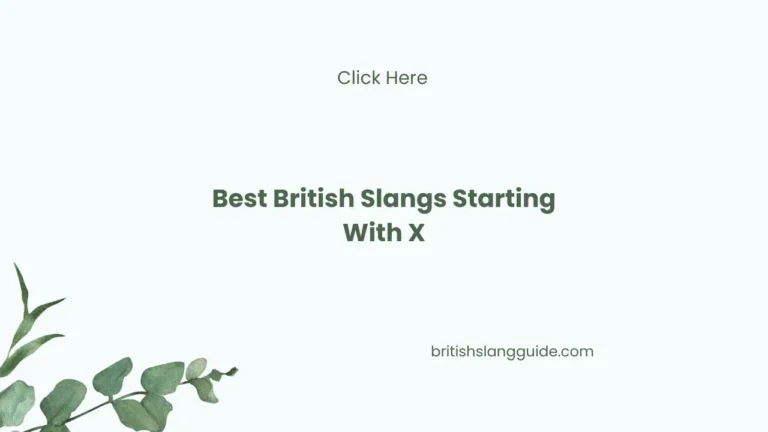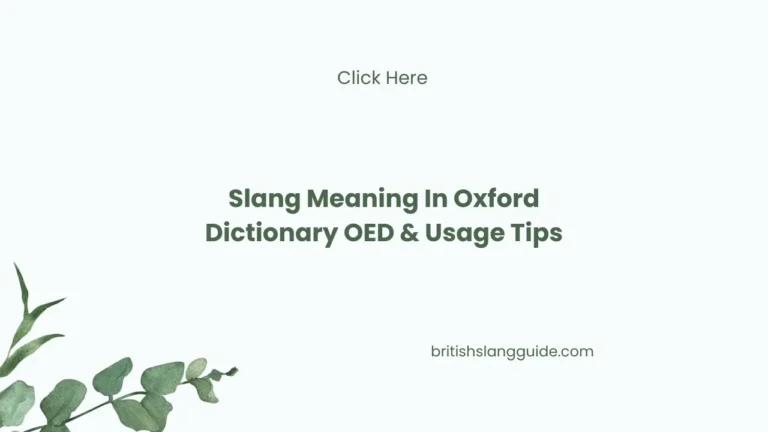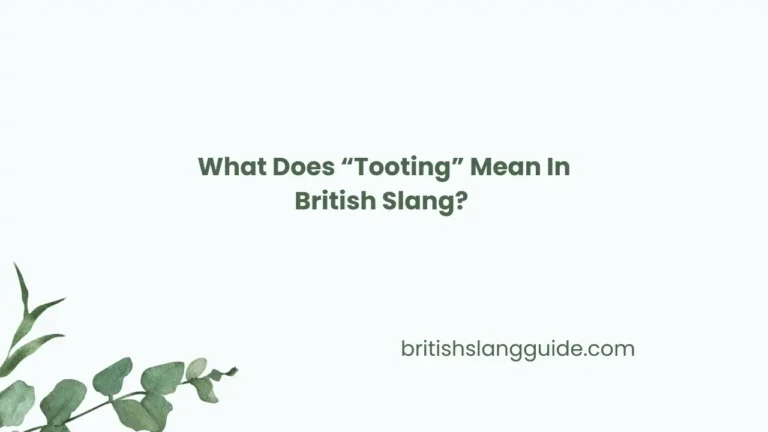30+ Best British Slangs Starting With “B”
British slang is adding a unique aspect to the English language, offering unique expressions and phrases that add flavor to everyday conversations. Let’s dive into some famous best British slang starting with the letter “B” and explore their meanings, origins, synonyms, and usage examples.
1. What Does “Babs” Mean in British Slang?
Meaning of “Babs”
In British slang, “Babs” is a term often used to refer to a woman, particularly a girlfriend or a female friend or companion.
Origin of “Babs”
The origin of “Babs” as slang for a woman is not entirely clear, but native speakers believe that it is derived from the nickname “Babs” itself.
Synonyms for “Babs”
Babe: A term babe used for a woman, often used to convey affection or attractiveness.
- Usage Example: “She’s not just any babe, she’s the love of my life.”
Bird: A casual and slangy way to refer to a woman, similar to “chick” or “babe.”
- Usage Example: “Check out that bird over there, she’s stunning.”
Chick: A familiar and informal term for a woman, often used among friends or in casual conversation or setting.
- Usage Example: “Hey chick, wanna grab a drink later?”
Usage Examples of “Babs”
- “Hey mate, I’m going out with my babs tonight.”
- “Have you met Erica’s new babs? She’s lovely.”
- “She’s not just any babs, she’s my girlfriend.”
2. What Does “Baccy” Mean in British Slang?
Meaning of “Baccy”
“Baccy” is a playful term used in British slang to refer to tobacco or cigarettes.
Origin of “Baccy”
The term “baccy” is a shortened form of the word “tobacco.”
Synonyms for “Baccy”
Tobacco: The formal term for the substance used in cigarettes or pipes.
- Usage Example: “He uses hard tobacco in his cigarettes.”
Cigs: A shortened, slangy version of “cigarettes.”
- Usage Example: “I’m trying to quit smoking, so I switched to vapes instead of cigs.”
Smokes: Another slang term for cigarettes or tobacco products.
- Usage Example: “I could smell the smokes on him as soon as he walked in.”
Usage Examples of “Baccy”
- “I need to go to the shop to get some baccy.”
- “Got any spare baccy for me?”
- “He smells of baccy, must have been smoking all day.”
3. What Does “Back to Front” Mean in British Slang?
Meaning of “Back to Front”
In British slang, “Back to Front” is a phrase used to describe something that is in a state of confusion.
Origin of “Back to Front”
The origin of this phrase was found in literary, referring to when something is the wrong way around, flipped, or reversed.
Synonyms for “Back to Front”
Upside down: When something is completely turned around or flipped over.
- Usage Example: “The room was upside down after the kids’ play.”
Inside out: It refers to something turned inside out, or disorganized.
- Usage Example: “Her bag was inside out, and she couldn’t find her keys.”
Topsy-turvy: A playful way to describe a situation that is confuseable or disorderly.
- Usage Example: “The house was topsy-turvy after the wild party.”
Usage Examples of “Back to Front”
- “His whole life seems to be back to front these days.”
- “You’ve got your jumper on back to front.”
- “Everything was back to front after the party.”
4. What Does “Bagged” Mean in British Slang?
Meaning of “Bagged”
In British slang, “Bagged” refers to being caught or arrested by the police.
Origin of “Bagged”
The term likely originates from the idea of being captured and placed in a bag, reflecting being taken away by the authorities.
Synonyms for “Bagged”
Nicked: A slang term meaning to be arrested or caught by the authorities.
- Usage Example: “He got nicked for speeding on the motorway.”
Collared: Another informal term indicating being caught or arrested.
- Usage Example: “The thief was finally collared after months of escaping the police.”
Caught: A straightforward term indicating being captured.
- Usage Example: “The man was caught red-handed trying to break into the house.”
Usage Examples of “Bagged”
- “He got bagged last night for shoplifting.”
- “The thieves were bagged trying to escape.”
- “I can’t believe he got bagged for speeding.”
5. What Does “Balls” Mean in British Slang?
Meaning of “Balls”
“Balls” in British slang is often used as an expression of disbelief, frustration, or emphasis.
Origin of “Balls”
The origin of using “balls” as an expression described above is unclear, but it has become a common part of British colloquial language by native speakers.
Synonyms for “Balls”
Nonsense: Used to indicate that something is not true or believable.
- Usage Example: “Don’t listen to him, it’s all nonsense.”
Rubbish: A British term for something that is nonsense or not worth considering.
- Usage Example: “She told me some rubbish excuse about missing the bus.”
Bollocks: A strong and vulgar term used to express disbelief or annoyance.
- Usage Example: “Oh, bollocks! I forgot my phone at home.”
Usage Examples of “Balls”
- “Balls! I can’t believe he won again.”
- “He talks a lot of balls when he’s had a few drinks.”
- “Oh, balls! I forgot my wallet at home.”
6. What Does “Banter” Mean in British Slang?
Meaning of “Banter”
“Banter” is a term in British slang used to describe light-hearted, playful teasing or joking between friends.
Origin of “Banter”
The term “banter” likely comes from the Middle French word “bant” meaning “a jest.”
Synonyms for “Banter”
Teasing: Playful and good-natured teasing fun at someone in a friendly manner.
- Usage Example: “The banter between them never fails to make everyone laugh.”
Joking: Used in humorous remarks or exchanges for amusement.
- Usage Example: “We spent the evening joking with each other.”
Chaff: Light-hearted teasing or banter, often done with affection.
- Usage Example: “The banter and chaff between siblings is always entertaining.”
Usage Examples of “Banter”
- “They were all having a good bit of banter at the club.”
- “Don’t take it seriously, it’s just banter.”
- “His banter always lightens the mood.”
7. What Does “Bare” Mean in British Slang?
Meaning of “Bare”
“Bare” in British slang is used to describe something that is a lot or many, often used to emphasize abundance.
Origin of “Bare”
The term “bare” in this context likely comes from the word meaning “uncovered” or “exposed.”
Synonyms for “Bare”
Loads: A unique way of saying there is a significant or excessive amount of something.
- Usage Example: “We’ve got loads of work to finish before the deadline.”
Tons: Signifying a considerable quantity or number of something.
- Usage Example: “There were tons of people at the concert last night.”
Heaps: Refers to a large and plenty amount of something.
- Usage Example: “She’s got heaps of clothes in her wardrobe.”
Usage Examples of “Bare”
- “There were bare people at the party.”
- “He’s got bare money in his wallet.”
- “We’ve got bare work to do before the deadline.”
8. What Does “Barking” Mean in British Slang?
Meaning of “Barking”
“Barking” in British slang is used to describe someone who is crazy or behaving strangely and it’s mostly used for young boys.
Origin of “Barking”
The origin of this term is likely from the idea of a barking dog, representing someone acting strangely.
Synonyms for “Barking”
Mad: Used to describe irrational or misbehaving behavior.
- Usage Example: “He must be mad if he thinks that plan will work.”
Insane: A stronger term indicating extreme irrationality or madness.
- Usage Example: “Her ideas are completely insane; they’ll never work.”
Loony: Informal slang for someone who is mentally unstable.
- Usage Example: “You’re acting a bit loony today; what’s gotten into you?”
Usage Examples of “Barking”
- “He’s gone completely barking mad!”
- “Are you barking? That’s a bad idea!”
- “She’s been acting a bit barking since yesterday.”
9. What Does “Bars” Mean in British Slang?
Meaning of “Bars”
“Bars” in British slang refers to a person’s impressive or skilled lyrics, especially in rap music.
Origin of “Bars”
The term “bars” in this context comes from the idea of the bars in a musical score, representing each measure of music.
Synonyms for “Bars”
Rhymes: The words that form the poetic or lyrical content of a song.
- Usage Example: “He’s known for his clever rhymes and wordplay.”
Lines: Referring to the individual phrases or sentences in a rap song.
- Usage Example: “She delivered some killer lines in her latest track.”
Verses: Sections of a song that contain the lyrics, often with a specific rhyme scheme.
- Usage Example: “The rapper’s verses were filled with powerful emotions.”
Usage Examples of “Bars”
- “He dropped some sick bars in his latest track.”
- “Have you heard her freestyle? She’s got bars!”
- “The battle rapper came with killer bars in the competition.”
10. What Does “Bash” Mean in British Slang?
Meaning of “Bash”
“Bash” in British slang is commonly used to refer to a party or a gathering, usually with music and dancing.
Origin of “Bash”
The term “bash” likely originates from the idea of hitting something with force, and the energetic atmosphere of a party.
Synonyms for “Bash”
Shindig: A lively or noisy party or celebration.
- Usage Example: “We’re throwing a shindig for his birthday next week.”
Rave: A large and lively party with music, dancing, and often drugs.
- Usage Example: “The club was packed for the rave last night.”
Gathering: A casual or informal gathering of people for a specific purpose.
- Usage Example: “We’re having a little gathering at our place this weekend.”
Usage Examples of “Bash”
- “We’re having a little birthday bash for Sarah next weekend.”
- “The club is throwing a huge bash for New Year’s.”
- “Let’s go to Jack’s place; he always throws the best bashes.”
11. What Does “Batty” Mean in British Slang?
Meaning of “Batty”
“Batty” in British slang is used to describe something or someone as crazy or unpredictable.
Origin of “Batty”
The term “batty” likely comes from the word “bat,” known for its unpredictable flight patterns.
Synonyms for “Batty”
Mad: A general term for irrational or unusual behavior.
- Usage Example: “The old professor was a bit mad, but everyone loved him.”
Loopy: Informal slang for someone who behaves in a silly manner.
- Usage Example: “My brother sometimes acts loopy.”
Bonkers: A playful and informal way of describing someone who is acting crazy.
- Usage Example: “He went bonkers when he heard the news.”
Usage Examples of “Batty”
- “She’s gone a bit batty ever since she started that new hobby.”
- “The old man down the street is a bit batty, always talking to himself.”
- “Don’t mind her, she’s just being a bit batty today.”
12. What Does “Bby” Mean in British Slang?
Meaning of “Bby”
“Bby,” short for “baby,” is often used as a term of affectionate address in British slang.
Origin of “Bby”
The term “bby” as slang likely originated from the affectionate use of “baby” to refer to a loved one or significant other.
Synonyms for “Bby”
Babe: A classic term used for a loved one or significant other.
- Usage Example: “Hey babe, what do you want to do tonight?”
Darling: A sweet and affectionate term used to address someone dear to you.
- Usage Example: “Thank you for the flowers, darling; they’re beautiful.”
Sweetheart: An affective term often used to show affection or fondness.
- Usage Example: “You’re my sweetheart, and I love you.”
Usage Examples of “Bby”
- “Hey bby, how was your day?”
- “I miss you, bby. When are you coming home?”
- “Thanks for the gift, bby. You’re the best.”
13. What Does “Bc” Mean in British Slang?
Meaning of “Bc”
“Bc” in British slang is an abbreviation for “because,” commonly used in informal written communication.
Origin of “Bc”
The abbreviation “bc” for “because” likely emerged from the need for quick and efficient texting or online messaging.
Synonyms for “Bc”
Cuz: A shortened and informal version of “because,” often used in casual conversations.
- Usage Example: “I can’t come tonight cuz I have to work late.”
Cos: Another abbreviated form of “because,” commonly used in text messages or chats.
- Usage Example: “I’m going to the beach tomorrow cos the weather forecast looks great.”
Cos’: An even more informal and shortened version of “because,” often used.
- Usage Example: “I’ll be late cos’ I missed the bus.”
Usage Examples of “Bc”
- “I am unable to come today bc I was feeling tired.”
- “We’re meeting at the club later, Bc it’s John’s birthday.”
- “Bc of the rain, the picnic got postponed.”
14. What Does “Bean” Mean in British Slang?
Meaning of “Bean”
“Bean” in British slang is often used to describe someone’s head or mind, particularly when they’re acting foolishly.
Origin of “Bean”
The term “bean” as slang for “head” likely originated from the idea of a person’s head reflecting or resembling the shape and size of a bean.
Synonyms for “Bean”
Noggin: A playful and informal term for someone’s head or brain.
- Usage Example: “Use your noggin and think before you act.”
Noodle: Another playful term for the human brain or head.
- Usage Example: “I’ve got too much on my noodles to deal with this right now.”
Dome: A slangy and casual way of referring to someone’s head or skull.
- Usage Example: “I hit my dome on the low ceiling; it really hurt.”
Usage Examples of “Bean”
- “Don’t let it get to your bean, mate. It’s not worth it.”
- “She’s got a clever bean on her; always coming up with solutions.”
- “After a few pints, his bean isn’t working quite right.”
15. What Does “Beano” Mean in British Slang?
Meaning of “Beano”
“Beano” in British slang refers to a fun and enjoyable time, often involving laughter and enjoyment.
Origin of “Beano”
The term “beano” originates from the name of a popular British magazine, “The Beano,” known for its humorous and entertaining content.
Synonyms for “Beano”
Jolly: An old-fashioned term indicating a cheerful and festive atmosphere.
- Usage Example: “We had a jolly good time at the house last night.”
Frolic: Lively and playful enjoyment.
- Usage Example: “The children were full of laughter in the park.”
Merrymaking: Engaging in festivities or celebrations with joy and fondness.
- Usage Example: “The village square was alive with the sounds of merrymaking during the festival.”
Usage Examples of “Beano”
- “We had an absolute beano at the club last night.”
- “Join us for a beano at the park this Saturday.”
- “The office party turned into a wild beano.”
16. What Does “Beg” Mean in British Slang?
Meaning of “Beg”
“Beg” in British slang is often used to describe someone who is annoying, irritating, or constantly seeking attention.
Origin of “Beg”
The term “beg” likely comes from the idea of someone begging for attention or approval.
Synonyms for “Beg”
Pest: An irritating person who bothers or annoys others.
- Usage Example: “He’s such a pest, always asking for favors.”
Nuisance: Someone who causes inconvenience or annoyance to others.
- Usage Example: “She can be a bit of a nuisance when she’s in a bad mood.”
Irritant: A person who shows annoyance or frustration in others.
- Usage Example: “He’s a real irritant with his constant need for attention.”
Usage Examples of “Beg”
- “Stop being such a beg and leave me alone.”
- “He’s such a beg; always trying to impress everyone.”
- “Don’t beg and interrupt our conversation.”
17. What Does “Bellend” Mean in British Slang?
Meaning of “Bellend”
“Bellend” in British slang is a degrading term used to describe someone who is annoying, foolish, or generally disliked.
Origin of “Bellend”
The term “bellend” refers to the glans penis, used metaphorically to insult someone’s intelligence or behavior.
Synonyms for “Bellend”
Knobhead: A slang term used to insult someone’s intelligence or behavior.
- Usage Example: “Ignore him, he’s just a knobhead.”
Prick: A vulgar insult used to describe someone as foolish or unpleasant.
- Usage Example: “He’s acting like a real prick today.”
Idiot: A straightforward insult to someone who lacks intelligence or common sense.
- Usage Example: “Don’t listen to that idiot; he doesn’t know about anything.”
Usage Examples of “Bellend”
- “I can’t believe he did that; what a bellend!”
- “Don’t listen to him; he’s just being a bellend.”
- “She’s dating that bellend? What is she thinking?”
18. What Does “Bender” Mean in British Slang?
Meaning of “Bender”
“Bender” in British slang is a term used to describe someone who is drunk, often to an extreme degree.
Origin of “Bender”
The term “bender” likely comes from the idea of someone bending due to intoxication.
Synonyms for “Bender”
Drunkard: A person who frequently gets drunk or intoxicated.
- Usage Example: “He’s a bit of a drunkard, always disturbing his friends.”
Wasted: A slang term for being heavily intoxicated or drunk.
- Usage Example: “After that party, we were all completely wasted.”
Hammered: Another slang term for being extremely drunk or intoxicated.
- Usage Example: “She got absolutely hammered at the concert last night.”
Usage Examples of “Bender”
- “He went on a bender last night and can’t remember a thing.”
- “After a few drinks, she was on a bender.”
- “Let’s not invite him; he always ends up on a bender.”
19. What Does “Bent” Mean in British Slang?
Meaning of “Bent”
The “Bent” in British slang is used to describe something that is not straight or honest, often referring to illegal or dishonest activities.
Origin of “Bent”
The term “bent” likely originates from the idea of something being that is not in alignment.
Synonyms for “Bent”
Crooked: It was used in the context of dishonest or corrupt.
- Usage Example: “Watch out for him; he’s involved in some crooked deals.”
Corrupt: Involving dishonest or unethical behavior, especially for personal gain.
- Usage Example: “The company was found to be corrupt in its dealings.”
Dishonest: Not truthful or straightforward unethical.
- Usage Example: “I don’t trust him; he’s always been dishonest in his business.”
Usage Examples of “Bent”
- “The whole deal seems a bit bent to me; I wouldn’t trust it.”
- “He’s known for being a bit bent with his business practices.”
- “He bents in all the situations.”
20. What Does “Berk” Mean in British Slang?
Meaning of “Berk”
“Berk” in British slang is a term used to describe someone who is foolish, stupid, or acting in a silly manner.
Origin of “Berk”
The term “Berk” likely originates from the Cockney rhyming slang “Berkshire Hunt,” rhyming with “c**t.”
Synonyms for “Berk”
Idiot: A person who lacks intelligence or common sense.
- Usage Example: “Don’t be such an idiot; you know that won’t work.”
Fool: Someone who lacks good judgment or acts unwisely.
- Usage Example: “He’s acting like a fool, thinking he can get away with it.”
Moron: A derogatory term for someone considered to be very stupid or foolish.
- Usage Example: “I can’t believe he did that; what a moron.”
Usage Examples of “Berk”
- “Don’t be a berk; just do it the right way.”
- “He’s acting like a right berk today.”
- “I can’t believe I did that; what a berk move!”
21. What Does “Bev” Mean in British Slang?
Meaning of “Bev”
“Bev” in British slang is a shortened form of “beverage,” often used to refer to alcoholic drinks.
Origin of “Bev”
The term “bev” is a casual and abbreviated way of referring to a refreshing drink, particularly alcoholic.
Synonyms for “Bev”
Drink: A general term for any liquid consumed for refreshment.
- Usage Example: “Let’s go for a drink after work; I could use a break.”
Booze: Informal slang for alcoholic beverages.
- Usage Example: “They were all drinking booze and having a good time.”
Tipple: A casual and often humorous term for an alcoholic drink.
- Usage Example: “Fancy a tipple? I’ve got some wine open.”
Usage Examples of “Bev”
- “Let’s grab a few bevs at the pub after work.”
- “Do you fancy a bev with dinner tonight?”
- “We’re having a barbecue; bring your own bevs!”
22. What Does “Bird” Mean in British Slang?
Meaning of “Bird”
“Bird” in British slang is a colloquial term used to refer to a woman, similar to “chick” or “girl.”
Origin of “Bird”
The term “bird” likely comes from the idea of a free creature, resembling a woman’s beauty.
Synonyms for “Bird”
Chick: A casual and informal term for a woman, similar to “bird.”
- Usage Example: “He’s always surrounded by chicks whenever we go out.”
Girl: A straightforward term for a female person, often used informally.
- Usage Example: “I saw him with a new girl at the party last night.”
Lady: A more formal and respectful term for a woman.
- Usage Example: “She’s a true lady, always elegant and poised.”
Usage Examples of “Bird”
- “He’s always hanging out with that new bird from work.”
- “Have you seen the bird Tom’s been dating? She’s stunning.”
- “She’s not just any bird; she’s his girlfriend.”
23. What Does “Bit” Mean in British Slang?
Meaning of “Bit”
“Bit” in British slang is often used to describe something small, insignificant, or a short amount of time.
Origin of “Bit”
The term “bit” likely comes from its literal meaning of a small portion or piece of something.
Synonyms for “Bit”
Little: Small in size or quantity, often used to describe something insignificant.
- Usage Example: “She’s just a little bit late, don’t worry.”
Piece: A small portion or amount of something.
- Usage Example: “Could I have a piece of cake, please?”
Short while: A brief amount of time.
- Usage Example: “We’ll be there in a short while, just finishing up.”
Usage Examples of “Bit”
- “I’ll just be a bit late; traffic is terrible.”
- “Can I borrow a bit of your time to discuss something?”
- “He’s a bit of a comedian; always cracking jokes.”
24. What Does “Blame” Mean in British Slang?
Meaning of “Blame”
“Blame” in British slang is used to describe someone or something unattractive or unappealing.
Origin of “Blame”
The term “blame” likely comes from its use as a derogatory term towards something undesirable.
Synonyms for “Blame”
Ugly: Unpleasant to look at or unattractive.
- Usage Example: “She’s wearing such an ugly sweater today.”
Unattractive: Not appealing or attractive in appearance.
- Usage Example: “The new painting is rather unattractive, don’t you think?”
Unappealing: Not attractive or desirable.
- Usage Example: “I find the idea of camping in the rain very unappealing.”
Usage Examples of “Blame”
- “That outfit is so blaming; you should change.”
- “She’s going out with him? He’s proper blame!”
- “I’m not going to that club; it’s full of blame people.”
25. What Does “Blanket” Mean in British Slang?
Meaning of “Blanket”
“Blanket” in British slang is a term used to describe a large, unattractive woman.
Origin of “Blanket”
The term “blanket” likely comes from its association with something large, covering, and unappealing.
Synonyms for “Blanket”
Chubby: Having a pleasantly plump or slightly overweight body.
- Usage Example: “She’s a bit chubby, but she’s confident and happy.”
Large: Describing someone as physically big or heavy.
- Usage Example: “He prefers dating large women; he likes someone he can enjoy with.”
Plus-size: A more respectful term for someone who is larger in size.
- Usage Example: “The fashion industry is finally emerging with plus-size models.”
Usage Examples of “Blanket”
- “He’s always going for the blankets; he likes them big.”
- “I don’t know why he’s with her; she’s a total blanket.”
- “She might be a blanket, but she’s got a great personality.”
26. What Does “Blimey” Mean in British Slang?
Meaning of “Blimey”
“Blimey” in British slang is an exclamation of surprise, shock, or disbelief.
Origin of “Blimey”
The term “blimey” likely comes from the oath “God blind me,” used historically as an expression of surprise or shock.
Synonyms for “Blimey”
Crikey: An expression of surprise or amazement.
- Usage Example: “Crikey, that was a close call!”
Cor: A slangy and emphatic way to express surprise or astonishment.
- Usage Example: “Cor, did you see that?”
Gosh: A mild exclamation of surprise or shock.
- Usage Example: “Gosh, I didn’t expect that to happen!”
Usage Examples of “Blimey”
- “Blimey, I can’t believe you did that!”
- “Blimey, look at the size of that fish!”
- “Blimey, it’s freezing out here!”
27. What Does “Blinkered” Mean in British Slang?
Meaning of “Blinkered”
“Blinkered” in British slang is used to describe someone who has narrow or limited views, unable to see the bigger picture.
Origin of “Blinkered”
The term “blinkered” comes from the idea of a horse wearing blinkers, restricting its vision to what is directly in front.
Synonyms for “Blinkered”
Narrow-minded: Having limited or restricted views or opinions.
- Usage Example: “He’s too narrow-minded to see the benefits of the proposal.”
Close-minded: Unable to consider alternative ideas or perspectives.
- Usage Example: “She’s so close-minded; she won’t even listen to other opinions.”
Tunnel-visioned: Focused only on one thing, unable to see the bigger picture.
- Usage Example: “His tunnel-visioned approach to the project caused some issues.”
Usage Examples of “Blinkered”
- “He’s so blinkered; he can’t see the opportunities right in front of him.”
- “Don’t be so blinkered in your approach; consider all options.”
- “Her blinkered views on politics prevent her from seeing other perspectives.”
28. What Does “Blob” Mean in British Slang?
Meaning of “Blob”
“Blob” in British slang is used to describe someone who is unattractive or unappealing.
Origin of “Blob”
The term “blob” likely comes from its association with something shapeless, formless, and unattractive.
Synonyms for “Blob”
Lump: A shapeless or unattractive person.
- Usage Example: “He’s turned into a bit of a lump since he stopped working out.”
Bump: A term used to describe someone as unattractive or unappealing.
- Usage Example: “She used to be cute, but now she’s just a bump.”
Shapeless: Lacking a defined or attractive shape.
- Usage Example: “She wore a shapeless dress that did nothing for her figure.”
Usage Examples of “Blob”
- “I can’t believe he’s dating that blob; she’s not his usual type.”
- “She used to be cute, but now she’s just turned into a blob.”
- “Don’t call her a blob; that’s not nice!”
29. What Does “Bloke” Mean in British Slang?
Meaning of “Bloke”
“Bloke” in British slang is a term used to refer to a man, similar to “guy” or “fella.”
Origin of “Bloke”
The term “bloke” likely comes from the Middle Dutch word “blok,” meaning “man.”
Synonyms for “Bloke”
Guy: A casual and informal term for a man.
- Usage Example: “He’s a cool guy; we should invite him to the party.”
Fellow: Another informal term for a man, often used in a friendly way.
- Usage Example: “He’s a decent fellow; always willing to lend a hand.”
Chap: A more old-fashioned and traditional term for a man.
- Usage Example: “He’s a proper chap; very polite and well-mannered.”
Usage Examples of “Bloke”
- “He’s a good bloke; always willing to help out.”
- “Have you seen that bloke at the pub? He’s hilarious!”
- “She’s going out with some bloke she met online.”
30. What Does “Blood Clot” Mean in British Slang?
Meaning of “Blood Clot”
“Blood clot” in British slang is a derogatory term used to describe someone who is irritating, annoying, or frustrating.
Origin of “Blood Clot”
The term “blood clot” likely comes from the idea of something troublesome, having to a clot in the bloodstream.
Synonyms for “Blood Clot”
Pain: A person who causes annoyance or irritation.
- Usage Example: “She’s a real pain; always complaining about something.”
Annoyance: Someone or something that causes irritation or displeasure.
- Usage Example: “Dealing with him is such an annoyance.”
Nuisance: A person who is bothersome or causes inconvenience.
- Usage Example: “She’s becoming quite a nuisance with all her demands.”
Usage Examples of “Blood Clot”
- “He’s such a blood clot; always messing things up.”
- “I can’t deal with her; she’s a real blood clot.”
- “Don’t be a blood clot and ruin the party for everyone else.”
31. What Does “Blood” Mean in British Slang?
Meaning of “Blood”
“Blood” in British slang is a term of endearment used among friends or close relations.
Origin of “Blood”
The term “blood” likely comes from the idea of family ties or loyalty, often to “blood brothers.”
Synonyms for “Blood”
Mate: A close friend or companion.
- Usage Example: “Thanks, mate, I really appreciate it.”
Pal: A friendly and informal term for a friend.
- Usage Example: “He’s been my pal since we were kids.”
Buddy: A casual and familiar term for a friend or companion.
- Usage Example: “Hey buddy, let’s grab a drink.”
Usage Examples of “Blood”
- “Alright, blood? How’s it going?”
- “I’m happy that my blood protected me.”
- “Hey, blood, fancy a pint after work?”
32. What Does “Blud” Mean in British Slang?
Meaning of “Blud”
“Blud” in British slang is a variation of “blood,” used similarly as a term of familiarity or friendship.
Origin of “Blud”
The term “blud” is a shortened and informal version of “blood,” used in casual conversations.
Synonyms for “Blud”
Bro: A shortened form of “brother,” used informally among friends.
- Usage Example: “What’s up, bro? Long time no see.”
Bruv: Another informal term for “brother” or close friend.
- Usage Example: “Hey bruv, fancy a game of football this weekend?”
Fam: Short for “family,” used to describe close friends or associates.
- Usage Example: “You’re like our fam.”
Usage Examples of “Blud”
- “Yo, blud, what’s good?”
- “Don’t worry, blud, I’ve got your back.”
- “Let’s roll, blud, we’re gonna be late.”
33. What Does “Bob” Mean in British Slang?
Meaning of “Bob”
“Bob” in British slang is a term used to describe one pound sterling, particularly in the context of money.
Origin of “Bob”
The term “bob” comes from the traditional British currency, where one shilling was often referred to as a “bob.”
Synonyms for “Bob”
Quid: In Uk, one pound sterling was referred as quid.
- Usage Example: “It’ll cost you a few quid to get that fixed.”
Cash: Cash was also used for bob which refers the context of money.
- Usage Example: “I’ve only got a bit of cash on me; can you lend me some?”
Money: The general term for currency or legal tender.
- Usage Example: “I need to withdraw some money from the ATM.”
Usage Examples of “Bob”
- “Can you lend me a few bob until payday?”
- “It’ll cost you a couple of bobs to get that fixed.”
- “I’ve got no bobs left after the weekend.”
34. What Does “Bob’s Your Uncle” Mean in British Slang?
Meaning of “Bob’s Your Uncle”
“Bob’s your uncle” is a British expression used to indicate that something is simple, easy, or straightforward.
Origin of “Bob’s Your Uncle”
The origin of this phrase is unclear, but it’s often used humorously to suggest that a task or process is easily completed.
Synonyms for “Bob’s Your Uncle”
There you go: Used to indicate that something is completed or accomplished.
- Usage Example: “Just press this button, and there you go, it’s done.”
It’s done: An affirmation that something has been successfully completed.
- Usage Example: “Add the sauce, mix it up, it’s done.”
Voila: A French word meaning “there it is,” often used to indicate the completion of a task.
- Usage Example: “Mix the ingredients, put it in the oven, and voila, dinner is served.”
Usage Examples of “Bob’s Your Uncle”
- “Just add a bit of salt, stir it up, and Bob’s your uncle, dinner’s ready.”
- “Press this button, turn the knob, and Bob’s your uncle, the machine starts.”
- “You want to fix the leak? Tighten that bolt, seal the pipe, and Bob’s your uncle, no more leak.”
35. What Does “Bricking It” Mean in British Slang?
Meaning of “Bricking It”
“Bricking it” in British slang is a colloquial term used to describe someone who is extremely nervous, scared, or anxious about something.
Origin of “Bricking It”
The term “bricking it” likely comes from the idea of someone being so frightened that they feel as if they might produce bricks.
Synonyms for “Bricking It”
Shaking in One’s Boots: This phrase emphasizes extreme fear or nervousness as if one’s legs are shaking uncontrollably.
- Usage Example: “He was shaking in his boots before the big presentation.”
Scared Stiff: This expression signifies being so frightened that one becomes immobile, unable to move due to fear.
- Usage Example: “The horror movie had her scared stiff; she couldn’t even look at the screen.”
Terrified: This word denotes extreme fear or panic in a situation.
- Usage Example: “She was absolutely terrified of spiders; even a picture made her scream.”
Usage Examples of “Bricking It”
- “I’m bricking it about the exam tomorrow; I haven’t studied enough.”
- “He was bricking it when he saw the size of the waves for his first surfing lesson.”
- “Don’t tell him about the haunted house; he’ll be bricking it all night.”
36. What Does “Brilliant” Mean in British Slang?
Meaning of “Brilliant”
“Brilliant” in British slang is used to express approval or excitement about something.
Origin of “Brilliant”
The term “brilliant” likely comes from its standard English usage meaning excellent, outstanding, or fantastic.
Synonyms for “Brilliant”
Fantastic: This word denotes something extraordinary, wonderful, or exceptionally good.
- Usage Example: “The party last night was fantastic; I had such a great time.”
Superb: This term signifies something of the highest quality, excellence, or impressiveness.
- Usage Example: “She did a superb job on her presentation; it was very informative.”
Outstanding: This word indicates something exceptional, remarkable, or standing out from the rest.
- Usage Example: “The team’s performance was outstanding; they really gave it their all.”
Usage Examples of “Brilliant”
- “That film was brilliant; I couldn’t stop laughing.”
- “She did a brilliant job in organizing the event.”
- “Brilliant idea! Let’s go for a picnic in the park this weekend.”
Conclusion:
British slang offers a colorful and unique flavor to the diverse British language used in everyday conversations. From “Babs” to “Bars,” these terms add unique aspects and character to the English language, showcasing the creativity of British speakers.
If you’ve enjoyed learning about these British slang, why not share them with your friends and add some fun to your conversations.







